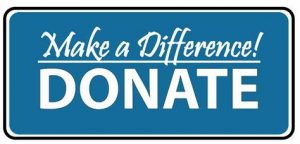EDITOR’S NOTE: This article was first published on June 3, 2017, by Tobiyah Carandang. We are re-publishing this to highlight the connection that the Philippines and Israel have with each other, especially since Rosh Hashana is coming up. Let us celebrate the Jewish New Year with them
Jewish Ties to the Philippines
Esther 4:14 CJB
“14 For if you fail to speak up now, relief and deliverance will come to the Jews from a different direction; but you and your father’s family will perish. Who knows whether you didn’t come into your royal position precisely for such a time as this.”
These were the very words echoing through Esther’s head when faced with a decision that could dictate the very existence of her people. To hold her tongue and save her own life or to risk her life and plead with King Ahasuerus for the Jews’ deliverance.
Most of us will probably never have to make such a life-threatening choice that can jeopardize a whole nation, but for the late President Manuel L. Quezon, the dilemma was just that.
As Adolf Hitler began his abominable dictatorship over Germany, roughly 6 million Jews and other peoples were being exterminated across Europe. During this hate-fueled genocide called the Holocaust, many were forced out of their homes and shipped into concentration camps while others were taken in for medical experimentation. Fortunately, several thousands of Jews were quick enough to flee to other countries that were not under Nazi tyranny; one of those countries being the Philippines.
Despite being in office for only about three years at the time, President Manuel L. Quezon made a choice that would change not only the history of the Philippines, but also that of Jews all over the world. Amidst many countries closing their doors to the exiled Jews, President Quezon decided that the Philippines would not withhold a helping hand to those seeking refuge amidst crisis.
In the words of President Quezon himself, “It is my hope and indeed my expectation, that the people of the Philippines will have in the future every reason to be glad, that when the time of need came, their country was willing to extend a hand of welcome.”
Though not yet completely independent from the US, the Philippines opened its doors to thousands of Jewish migrants. He eagerly administered thousands of visas for Jewish migrants and even supplied them with land; some from his privately own property in Marikina. For roughly 1,200 Jews, cries of anguish turned into tears of joy, the gruesome exile became a warm welcome, and their captivity turned into freedom.
Even after the passing of President Quezon, the spirit to free the Jewish people remained in the Philippines. In a 1947 United Nations General Assembly, the Philippines, then led by President Manuel Roxas, was the only nation in Asia to vote for the partition of Palestine. Thus, breaking the tie of votes and giving way to the birth of the State of Israel.
In remembrance of President Quezon’s moral courage and the Philippine’s bold “yes” for the establishment of Israel, the Israeli government declared that Filipino tourists and skilled workers be granted visa-free access to their land. Of course as a testament to Philippine hospitality, we too, do not require visas for Israeli tourists up to 59 days.
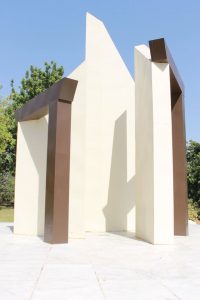
The “Open Doors” Monument.
Righteous among Nations Boulevard,
Rishon Lezion, Israel
Photo by Jhe-ann Ricafort
In 2009, The “Open Doors” Monument was revealed to the public as a symbol of the strong Israel-Philippine friendship. The imposing steel and marble masterpiece exhibits 3 doors to represent the warm welcome received by exiled Jews into Philippine soil. 3 footprints etched into Romblon marble which are actual footprints of 2 Jewish refugees and that of a Filipino-Israeli born in the Philippines, granddaughter of a holocaust survivor. The tribute, from a bird’s-eye view, also shows 3 triangles: 1 triangle from the Philippine flag, and 2 triangles from the Star of David in the Israeli flag. Truly, this is a lasting testimony of the strong bond between two nations.
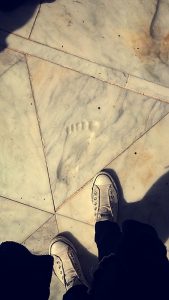
My feet next to the etched footprint of a Holocaust survivor. Rishon Lezion, Israel
Photo by Tobiyah Carandang
“Hi, excuse me po. Pinoy?” I quickly felt a smile spread on my face as I heard these somewhat magical words. I’d only been living in Israel for about 2 months but in all honesty, I was already feeling a bit homesick. I hurriedly turned around and saw a petite Asian lady grinning back at me. I had never met this lady in my life, but it felt as if I’d known her for years. Maybe it was the familiar bisaya accent or the curious eyes as she stared back at me, or maybe it was the bayong she was holding that was filled to the brim with vegetables. I could almost hug her at that very moment, but I held myself. “Yes, po. Kamusta na po kayo?” I said a little bit too excitedly.
Her eyes lit up as she leaned in to interview me about my whereabouts. I told her that I was volunteering up north and that it was my day off. “Wow. Napaka swerte mo naman! Ang bata bata mo pa, pero nakarating ka na agad ditto,” she said as she jokingly squeezed my arm. “Salamat sa Diyos. Eh kayo po ba? Mukhang nag-eenjoy nga po kayo mamalengke dito eh. May kangkong po ba dyan?” I replied. She threw her head back and laughed loudly. “Kahit marami kaming mga pinoy na nagtatrabaho dito, nakakatuwa pa rin pag meron kaming nakikila na bagong dating dito.” She said as she adjusted her jacket. I tried to explain that this wasn’t my first trip to Israel and that two months didn’t feel as if I just arrived, but then I quickly realized what she meant when she mentioned that she’d been working in Israel for about ten years now. She goes on to tell me that despite her inability to return home for the past decade, her job as a caregiver was good. “Ewan ko nga eh. Pagnalalaman nilang [the Israelis] Pilipino ka, ang babait nila sayo. Well… di lahat ah. Karamihan lang.”
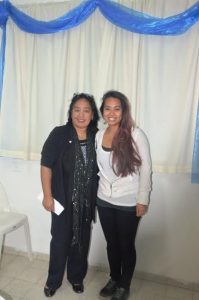
Meeting Pastora Naohmi from The Shepherd’s Arms Ministry. Haifa, Israel. Photo by Tobiyah Carandang
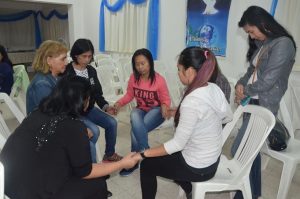
Praying with several members of the Filipino
congregation, Shepherd’s Arms Ministry. Haifa, Israel. Photo by Tobiyah Carandang
A few weeks passed, and I was invited to an “all-Filipino” worship service. There, I met the pastora of the Messianic congregation. She mentioned that there were around 40,000 Filipino workers in Israel. “Well, yun yung documented ha.” She said quite wittingly. She added, “Majority of these overseas workers are caregivers, but others work as employees for shops, nannies, and housemaids.” And she was right. The Filipinos make up the greatest majority of overseas workers in Israel.
I also learned that when Typhoon Yolanda hit the Philippines, Israel was one of the first countries to respond and contribute emergency supplies. Unbeknown to most, Israel’s International Development Corporation still continues to train some 3,000 Filipinos in agriculture, hoping to modernize the farming of our nation. Truly, all this is but a scrape on the surface of our deep ties with the Jewish people.
Whether it is the moral boldness to give a helping hand amidst adversity, or the selfless choice to say “yes” for the benefit of others, I believe the spirit of the Father’s love is ingrained in the heart of every Filipino.
Genesis 12:3 CJB
“I will bless those who bless you, but I will curse anyone who curses you; and by you all the families of the earth will be blessed.”
Past the several jobs offered, emergency aid given, or the opportunities to travel that the Israeli government has provided; past any towering monument that has ever been made, I believe the most glorious blessing our nation can receive is yet to come.
As Esther faced what was believed to be the inevitable fate of her people, she chose to disregard her life for the sake of her kinsmen. Even when President Quezon could have easily turned a deaf ear to the desperate cries of the Jewish people, he chose to heed and respond to the best of his capabilities.
As we are confronted by everyday situations to lay ourselves down for the benefit of those in need, will we rise up to be of use for such a time as this?
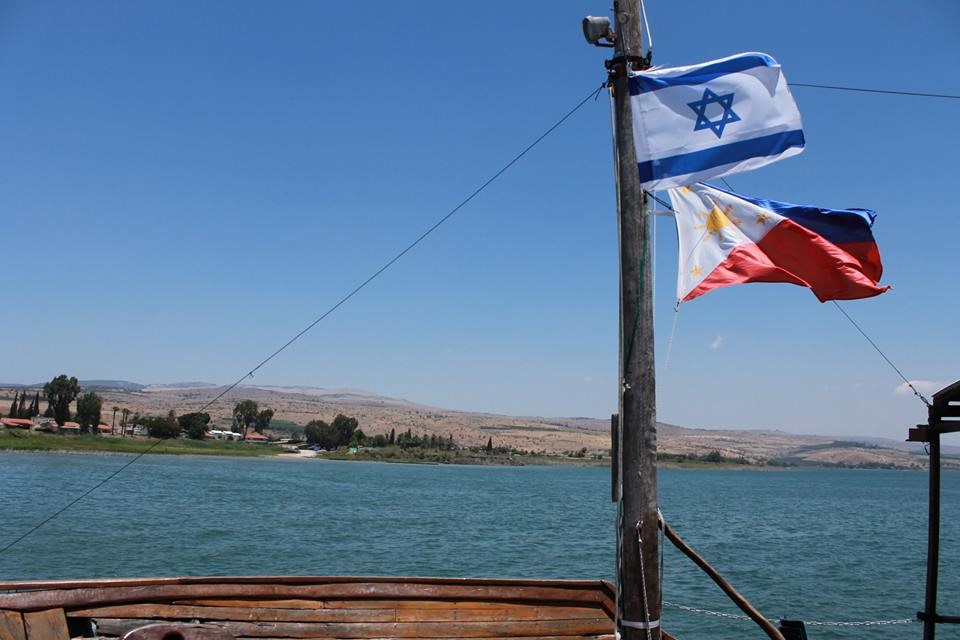
The Philippine flag and the Israeli flag hoisted on a single pole. Sea of Galilee, Israel. Photo by Jhe-ann Ricafort
Written on Purim 2017 by Tobiyah Carandang




